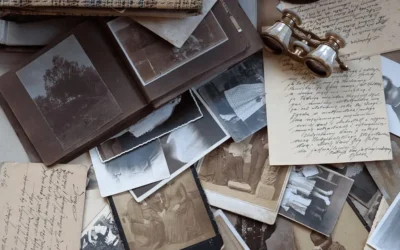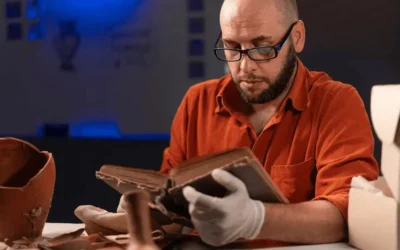Archivists: Neutral or Active?
Margot Note
Archivists often talk about the function of archives in our society. But what do we mean, exactly? Has the meaning changed over time?
Some of this way of thinking comes from the archivist Hilary Jenkinson. In his writing for the field, he discussed public faith, which he defined as the relationship between archives and the society they serve and the idea of government conducting public affairs, documented in the records.
Archives function as repositories of history and memory, and as such they serve several functions, such as the preservation of collective national memory, the constitution of national identity, and the creation of social space.
Neutral Stewards of History
The traditional assumption is that archivists are neutral stewards of history. A stance of neutrality implies that archivists:
- Objectively develop policies considering institutional missions.
- Worry about the authenticity of records but not the truth of records.
- Make selection decisions based on the records and the context of their creation.
- Use standards for description that support access to materials.
- Create use policies that support equal access within institutional restrictions and the law.
The classic archival article, Terry Cook’s “What is Past is Prologue,” runs through a century of archival history and theory, connecting archival theory from all over the western world. His emphasis is that trends have moved from a product-focused activity to a process-oriented activity. I argue that the emphasis on process makes archivists active catalysts of history.
Archivists as Agents
One crucial point is the notion that archival theory is ever-changing because of the need to adapt to changes in recordkeeping and how organizations work. Cook outlines five themes.
The first is in changes in the reasons why archives exist. Cook refers to a shift from a juridico-administrative justification for archives to a socio-cultural argument for archives, grounded in broader public policy and use based on history and expectations.
He also notes changes in the archival approach to preserving authenticity. Archivists no longer depend on the chain of custody of documents—which certainly doesn’t work with electronic records—which entail problems regarding how they are created as evidence. Preservation shifts from the medium to the information and evidence-bearing context.
He points out the changes in the archival approach to appraisal. Cook discusses diplomatics, which focuses on document characteristics and how archivists have moved more towards documenting functions of records creation.
There are also changes in the emphasis on archival impartiality. Archivists are no longer passive keepers of documents. Instead archivists are active shapers. The role of archivists as agent, and the influence of that role, is more clearly recognized.
Lastly, Cook notes changes from archival theory as a set of immutable rules to a more evolving body of ideas. He refers to archival theory as a vibrant collage of overlapping layers, allowing for the existence of contradictory ideas.
Engaged and Active
Innovative ideas regarding appraisal, arrangement, and description have come to fruition during the many years since Cook’s article appeared. For example, archivists tend to appraise not so much based on bodies of material, but on the functions and roles of the record creators and the significance of those functions and roles. Archival descriptive systems attempt to mesh context and content. Most importantly, archival access is now understood as more than just finding aids, but also reference, outreach, education, and vigorously connecting with communities.
All these activities are an attempt to describe (in rich context) archival records in diverse media from a connected point-of-view. More importantly, the archival profession has realized that it must better document the diverse communities they serve. Doing so requires archivists to be more inclusive in their practices, engage others with cultural competency, and understand the broad information needs of contemporary archives users. Rather than seeing archival work as merely the neutral construction of product, archivists are actively processing history and preserving our collective memory.
Margot Note
Margot Note, archivist, consultant, and author is a guest blogger for Lucidea, provider of ArchivEra, archival collections management software for today’s challenges and tomorrow’s. Read more of Margot’s posts here, and get your free copy of Margot’s brand new book for Lucidea Press, Demystifying Archival Project Management: Five Essentials for Success!
Similar Posts
Texas Archive of the Moving Image: Interview with the Digital Archivist
I recently interviewed Grace Muñoz about her work at the Texas Archive of the Moving Image. Her work on improving the discoverability of the multimedia collection is fascinating.
How to Conduct Comprehensive Archival Surveys
Conducting a comprehensive archival survey is critical to successfully managing archival collections.
Remembering History, Moving Forward Together, with ArchivEra
The Catholic Diocese of Arlington’s Director of Archives selected ArchivEra to manage their collections of historical and cultural significance, and strike a balance between security and access.
Unveiling Archival Impact
The transformative power of storytelling depends upon the strategic choices that top archival performers make and the shift from being record-keepers to change agents.




Leave a Comment
Comments are reviewed and must adhere to our comments policy.
0 Comments